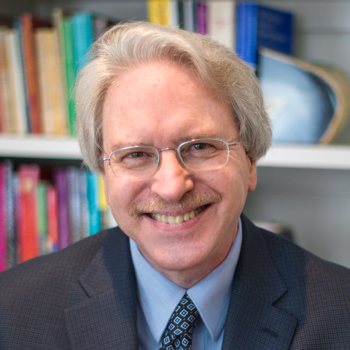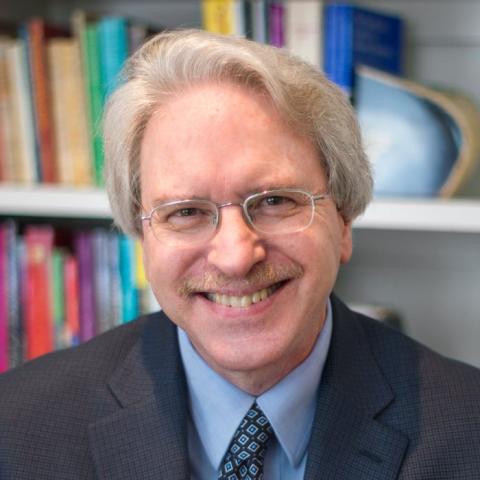A MLK Day Reflection from Kim Benston

On the occasion of Martin Luther King Day, the president writes about the urgent need to affirm foundational ideals that Dr. King set forth to recreate and heal "broken community."
To deprive a man of freedom is to relegate him to the status of a thing, rather than elevate him to the status of a person.
––Martin Luther King, Jr., Stride Toward Freedom, 1958
At the center of nonviolence stands the principle of love. … Along the way of life, someone must have sense enough and morality enough to cut off the chain of hate. This can only be done by projecting the ethic of love to the center of our lives. … When we speak of loving those who oppose us, we refer to neither eros nor philia; we speak of a love which is expressed in the Greek word agapē. Agapē means understanding, redeeming good will for all men. … It is not set in motion by any quality or function of its object. … It is love in action. Agapē is love seeking to preserve and create community. … I can only close the gap in broken community by meeting hate with love.
––Martin Luther King, Jr., “An Experiment in Love,” 1958
Friends,
Today I once again have the honor of addressing you on Martin Luther King Jr. Day, an occasion that summons us to reconsecrate our highest common values. In an age grown increasingly fractious, when the very language of "values" is rendered suspect by corrosive discourse, we urgently need to affirm foundational ideals that Dr. King set forth to recreate and heal "broken community."
I mark this moment's difficulty not as a lament but rather as a reminder that Dr. King's words and work can give distinctly valuable guidance in a time of national and global anxiety, distrust, and disquiet. Presently, I seize upon his belief that the future of human existence itself depends on our readiness to exercise our freedom through the constant discipline of nonviolence and the sometimes exacting demands of love. He tells us that we must interpret our individual freedom precisely as responsibility for others––for all others––before we can achieve the Beloved Community where justice abolishes domination, where agapē triumphs over our shared proclivity for scornful, self-defeating aggression.
This powerful message was birthed through a process of internal debate and interpersonal dialogue by which Dr. King both received and expounded wisdom. It has been my privilege these past several years to convey instances when some of our forebears at the College played a role, both directly and by association, in the evolution of Dr. King’s vision and action. While these networks of intellectual and spiritual kinship have become obscure over time, they proved momentous in their day. We have seen how, through experiences mediated by such figures as Rufus Jones (see here), Ira Reid (see here), and Dorothy Steere (see here), Dr. King sharpened his capacities for sustaining moral energy during the darker periods of the civil rights struggle. And at the core of this growth was Dr. King’s deepening conception of nonviolence as a true enactment of freedom––not simply a passive refusal to do harm but an active “project” dedicating the whole self to peaceful social transformation. This year I would like to trace how that conception of nonviolence derived in notable measure from the vision articulated at Haverford by a group of Quaker thinkers and activists at a crucial moment in American and global history. More particularly, I want to highlight an unsung leader of that group who was to become one of Dr. King’s closest advisors and comrades in the civil rights movement: the African-American Quaker and self-described “angelic troublemaker” Bayard Rustin.
Rustin’s work at Haverford, and its subsequent impact on Dr. King’s epochal vision of nonviolent resistance, emerged at the intersection of Rufus Jones’s liberal Quaker teachings, mid-twentieth-century America’s rise as an imperial power, and Rustin’s own remarkable history as an engaged theorist of what Haverford Religion professor Terrance Wiley, in his superb book on exemplars of American anarchist faith, has called “love-inflected sacrificial political ethics.” Raised by Quaker grandparents in nearby West Chester in the nineteen-tens and -twenties, Rustin experienced what he termed “a vital turn” in his youthful pursuit of spiritually infused social justice after hearing a lecture by Rufus Jones promoting Quaker spirituality as a mystic faith guided by “inner light” and affirmed through the renewal of just human relations. This “vital turn” led Rustin to decades of self-endangering dissidence that included incarceration as a radical pacifist during World War II, close association with militant African-American labor organizer A. Philip Randolph (doing work that prepared Rustin to be the practical architect of the 1963 March on Washington), and collaboration with the American Friends Service Committee (AFSC) to restore the rights of Japanese Americans during their infamous internment by the Roosevelt administration. Then Rustin came to Haverford College in early 1955 to join other Quaker activists in considering how best to advocate nonviolence in a world racked by geopolitical strife among post-WWII “super-powers,” neocolonial oppressions across the globe, and the specter of nuclear annihilation.
The group included such luminaries as Rustin’s mentor A.J. Muste (called by Time the “Number One U.S. Pacifist”) and AFSC leader Stephen G. Cary, a Haverford graduate who would later serve as the College’s acting president––but none had as great a hand in the product of their labor as Rustin, the conceptual framer and lead author of their achievement, the pacifist manifesto titled Speak Truth to Power. Long thought to be a phrase originating with Quaker founder George Fox, this talismanic maxim in fact seems to be Bayard Rustin’s coinage, one reflecting not just the courage to stand against unjust authority (to which his life as a Black, gay, socialist activist had already borne extended witness) but also the audacity of locating one’s own power to seek and speak truth as a wellspring of public dissent. Time and again, in between passages analyzing contemporary political strife, colonial violence, economic exploitation, and racial inequality, Speak Truth to Power articulates a philosophical appeal to unleash a “freedom of the spirit” and embrace peace as an “absolute commitment,” a “daily choice … to reject violence in one’s own life” in favor of the “revolutionary commitment to practice love in every area of experience.” Most movingly, Speak Truth to Power envisions freedom as a perpetual exercise of self-transcendence (the “overflowing love” of Dr. King’s agapē) through which we realize our own inner liberation by fostering the dignity of universal emancipation.
And yet Rustin’s name appears nowhere on this weighty, pathbreaking document. His omission from the author list in AFSC’s publication of Speak Truth to Power is both instructively ironic and richly apt. For Rustin’s sexual orientation, made public by a criminal charge of “lewd conduct” two years earlier, was deemed a liability for the peace movement (just as it was at times by Rustin’s fellow civil rights leaders), and he himself advocated his name’s suppression in the “higher” interests of the text’s potential impact. Thus, Rustin’s authorial erasure poignantly mirrored the self-sacrificial ethos that he envisioned and exemplified as a practitioner of nonviolent social protest.
At the same time, Rustin’s self-effacing generosity prepared him to exercise pivotal influence on Martin Luther King, Jr. in the crucial initial stages of the Reverend’s leadership of the Montgomery bus boycott. Not long after Speak Truth to Power’s publication, Rustin traveled to Montgomery in order to tutor Dr. King in the far-reaching potential of nonviolent practice. It is told that when he arrived, Rustin found the parsonage filled with guns, the pastor’s entourage heavily armed to meet the expected violence of Southern white supremacists. All night long, Rustin and King debated the relative merits of armed self-defense and nonviolent resistance, ranging from strategy to metaphysics, blending the personal and the political in a vigorous exchange that amounted, for Dr. King, to a wrestling match with what was indeed an angelic troublemaker. Ultimately, in a “vital turn” for the civil rights movement, Rustin convinced King that nonviolence must originate in one’s self, that one’s purpose and practice must be in harmony. From that encounter, Dr. King emerged baptized anew, as it were, in the deeper waters of nonviolence as a “way of life” that would carry his expansive vision of liberation beyond the borders of life itself.
That newfound insight, and its decisive role in the successful bus boycott that propelled Dr. King’s journey as the nation’s foremost voice for social justice, was given eloquent expression in Dr. King’s 1958 memoir Stride Toward Freedom, some key passages of which were written or closely edited by Bayard Rustin in language that strongly echoes Speak Truth to Power. Rustin’s and King’s voices were interwoven in this soaring account of how ordinary people risked death “to fight for their rights with the weapon of love, … acquiring a new estimate of their own human worth.” King’s memoir thus celebrated a broad enactment of the kind of love that Rustin and his fellow Quaker visionaries had earlier expounded in the 1955 project undertaken at Haverford.
We live in desperate need of such enactment again today. In our public sphere, roiled to chaos by invective and belligerence, the “weapon of love” is sorely wanting. The impact of Bayard Rustin’s thinking on the philosophy and work of Martin Luther King, Jr. shows us that thought expressed on this very campus can forge a countervailing and consequential vision of human promise. As Haverfordians, but even more as Americans and global citizens, and most profoundly as human beings, we are inheritors of that legacy. Let us each and all remain true to its essential spirit, practicing daily the demanding, courageous agapē that might yet constitute the world Dr. King gave his own life to bring about.
Peace,
Kim




